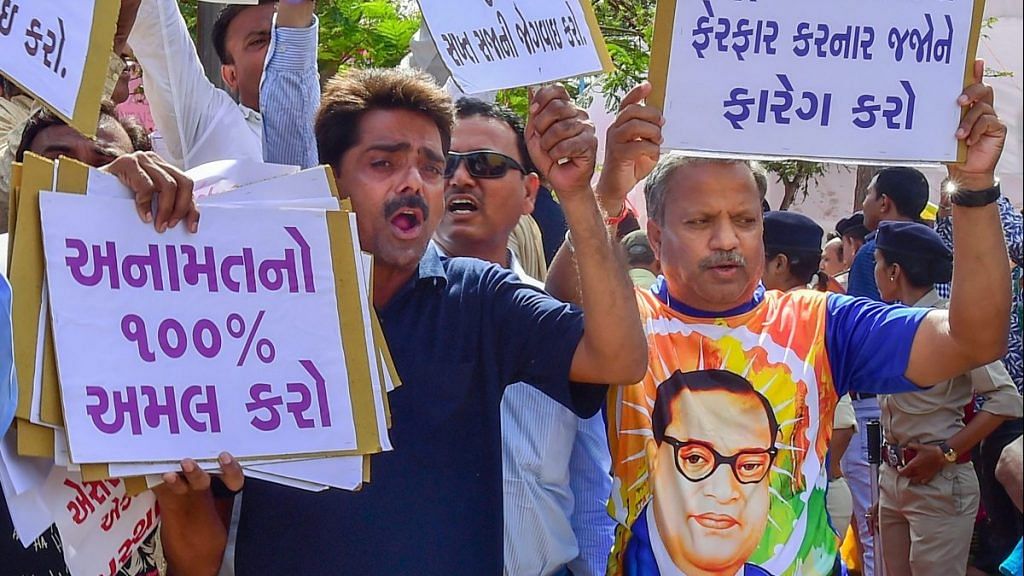Even OBC representation in higher bureaucracy is no more than 2.89 per cent; retired officers claim Dalits & tribals continue to face discrimination in career.
ThePrint is publishing articles on Dalit issues as part of Dalit History Month.
New Delhi: There are 81 secretary rank officers in the central government but only two are from scheduled castes and three from scheduled tribes, the government has said in response to an RTI application filed by ThePrint.
Overall, 9 per cent officers holding the rank of joint secretary and above belong to these two communities, the RTI reply said. The information comes amid a renewed debate over the abysmal representation of Dalits and tribals in the judiciary and bureaucracy.
The number of officers from the other backward classes (OBCs) is even fewer with nobody from these groups at the secretary or additional secretary level. At present, there are 13 OBC officers at the joint secretary level, making the OBC representation in the higher bureaucracy less than 3 per cent.
Factors behind low representation
Traditionally, the representation of SC/ST communities in the bureaucracy has been on the lower side.
The RTI reply shows there are 451 officers in the ranks of joint secretary and above, which include 81 secretaries, 75 additional secretaries and 295 joint secretaries. Among these only 40 officers are from SC and ST communities.
Last year, minister of state for personnel, pensions and public grievances Jitendra Singh, in a written reply in the Rajya Sabha, had said that the number of secretaries from SC/ST communities was four.
According to 2011 census data, there were 20.14 crore people belonging to scheduled castes in India, making Dalits account for 16.6 per cent of India’s population. STs account for 8.6 per cent.
While there is no provision for reservation for SCs/STs in the posts under the Central Staffing Scheme (CSS), governments generally insist that at the time of empanelment, efforts are made to include officers belonging to SC/ST categories, if necessary, by adopting liberal benchmarks as compared to officers of general category. However, the consistently low representation of the communities in higher echelons of the bureaucracy states otherwise, argue Dalit bureaucrats.
Bias against Dalit/tribal officers?
While entry is ensured for Dalit and tribal bureaucrats in the system through reservation, they continue to face discrimination within the system, which remains dominated by upper castes at the decision-making level, claims Amar Singh, a retired IAS officer.
“The bias in the system doesn’t leave just because you’ve entered the system,” he said.
The ingrained bias against Dalit manifests at the time of postings and promotion, he claimed. While the number of Dalits at the secretary level is itself low, Singh argues that even the numbers do not grasp the bigger problem.
“Even when they are promoted to senior positions, it is never in the meaty, decision-making ministries,” he says. “Dalits and tribals will never be made secretaries in defence, finance, among others,” he added.
So pertinent is the problem of discrimination against Dalit bureaucrats that a number of them got together to form a WhatsApp group, “Common Cause”, wherein experiences of discrimination and ways to circumvent biases were discussed. While the group has now closed, its members still meet every now and then to discuss issues, Singh says.
In 2016, when Dalit scholar Rohith Vemula committed suicide, P. Sivakami, a former IAS officer, said she had quit in 2008 after being treated like “an untouchable” in the government.
“Both the political class and bureaucracy work together against the Dalits. During my service, though my position was next to the minister in the state I was serving in, I had to struggle for basic rights for tribals,” Sivakami whose last posting was secretary of the Adi Dravidar and Tribal Welfare Department in Tamil Nadu, had told IANS.
“I was dubbed as a person who belongs to the community when I was working for their welfare. It amounted to untouchability. I realised that there was an unwritten law against people from the lower community,” she said.
While Dalit groups have been demanding reservations in promotions for a long time, no such provision exists at the central level. Last year, the Modi government had pleaded in the Supreme Court for providing quota in promotions for SC/STs in government jobs, urging the court for reconsideration of an earlier verdict holding against such reservation in promotions.
In 2006, the top court had said that in order to implement reservation in promotion, the state concerned “will have to show in each case the existence of the compelling reasons, namely backwardness, inadequacy of representation and overall administrative efficiency, before making provision for reservation”.
Read more from ThePrint’s Dalit History Month archives.
